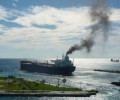

Knut Ørbeck-Nilssen, CEO of DNV Maritime, argues that maritime’s drive for decarbonization shouldn’t be seen as a race, but rather a dugnad. While the word means little outside of Norway, it has implications capable of transforming progress worldwide.
I don’t like the phrase “race to zero”. I understand the urgency of the situation confronting us and the requirement for bold action. But “race” invokes a sense of competition, of winners and losers, when what we really need is a movement that enables us all to cross the line together.
Energy transition needs joint efforts
That’s why we need a dugnad. “A what?!”, you might ask.
A dugnad is a Norwegian phenomenon. They happen throughout the country and involve everyone, from all strata of society. It’s where local communities, or groups, gather together to achieve goals – whether that be maintaining communal areas, raising money, or improving facilities like children’s nurseries or sports grounds. There’s no incentive (financial or otherwise) other than completing the project. Everyone is expected to play a part: everyone works and everyone benefits from the end result.
And that’s what we need for maritime’s essential energy transition – a global dugnad.
Pragmatic decarbonization progress
So, where to start? Well, we need to be pragmatic.
Our industry has been built on a platform of hydrocarbons and we can’t change that overnight. It would be fantastic to wave a wand that enabled us to switch to alternative fuels with impeccable green credentials, e.g. hydrogen, ammonia and sustainable biofuels. But that wand would have to work its magic on issues such as supply chain availability, infrastructure, technical maturity and understanding, and price, amongst other factors. These fuels might be the future, but there is real work to be done before ambition becomes reality.
That’s why I believe we need to turn to gas.
LNG and LPG already allow for practical solutions to start with
LNG and LPG can get this dugnad up and running.
Before I continue, let me calm those proclaiming that this “isn’t good enough” or “lacks ambition”. Doing nothing isn’t good enough. Arguing over potential solutions, leading to inaction, isn’t good enough.
But gas, thanks to a combination of availability, technological maturity and price, allows us to take positive action now with a practical solution that makes a tangible impact on industry GHG emissions.
DNV has worked with a number of owners to develop and class advanced dual-fuel gas tanker vessels that, together with onboard energy-reducing systems, can bring CO2 emissions down to within a range of 15–25%.
That isn’t the end game, but it’s an excellent, attainable, realistic start.
Internal and external partnerships needed for successful transition
While some roll their sleeves up to work with gas, others can get sweating on the pilot projects necessary to develop the solutions, technology and infrastructure our carbon-neutral future demands.
Industry needs to collaborate, internally and with a broad range of external stakeholders, to initiate R&D projects, form partnerships and begin testing real-world solutions with real-world commitment. Safety issues also need to be thoroughly investigated, analysed and addressed to ensure confidence in future fuels from both industry and society, while seafarer competence must evolve in line with technological development.
In the same way Class and Flag States have come together in The Maritime Technologies Forum – which conducts shared research to deliver guidance on alternative fuels and increased automation – our industry needs to gather individual resources and competence to work towards the same, uniform objectives. Class, as always, will be on hand to help.
Understanding each other’s strengths and needs in a decarbonized future
Dugnads are successful when everyone lends a hand and understands one another’s strengths and challenges. And this is critical now.
The gas adopters and R&D partners are just two elements in an ecosystem of change that requires cargo owners, energy companies, regulators, governments, ports and a diverse array of stakeholders, including society itself, to get the job done.
There’s a great deal of discussion about how best to do this, but we won’t do it at all if we don’t start. Gas provides the means to make real gains from the outset, while we collaborate on, and pilot, solutions that will turn grand ambition into achievable reality.
We have the most important job of our lifetimes in front of us. So, let’s get to work. Together.
Source: DNV https://www.dnv.com/expert-story/maritime-impact/Dugnad-to-zero-emissions.html?utm_campaign=MA_21Q3_ART_Ind_354_collaboration%20for%20decarbonization&utm_medium=email&utm_source=Eloqua